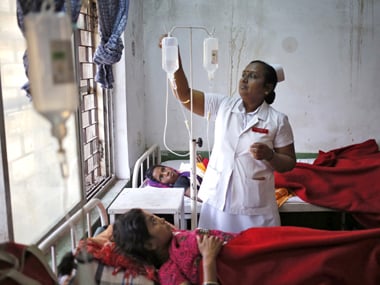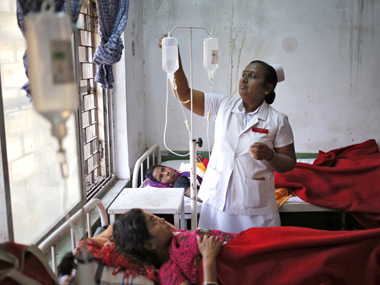Ever since the United Nations first made Universal Health Coverage (UHC) its target for the coming decades and started observing the International Universal Health Coverage Day on 12 December every year, the organisation and its member states’ chief focus has been on improving the quality of primary healthcare worldwide. The movement aims to ensure that each and every person should be able to access healthcare facilities without facing financial hardship in any way. [caption id=“attachment_4333695” align=“alignleft” width=“380”]  Representational image. Reuters[/caption] But to be able to achieve this, healthcare systems all over the world need to overcome the huge disparity in male and female access to healthcare provisions. The UHC is primed to do just that, especially since women and children form a large part of the world’s poverty-stricken population of 767 million people (according to a 2013 joint report by UN Women and the World Bank) and unable to gain access to healthcare facilities. While this looks good on paper, the practical considerations are too many. What’s more, most global healthcare systems depend on female health workers of all levels, who make up about 70% of the total health and social care workforce today. These workers are supposed to work towards eliminating the gender disparity but end up facing professional disadvantages due to gender discrimination themselves. This is the reason why the World Health Organisation convened a meeting of the Independent High-Level Commission in October 2019 and has now concurred that gender inequalities faced by women patients and health workers worldwide need to be addressed and eliminated with immediate effect.
Why the gender disparity?
One of the biggest barriers in executing the UHC on a global scale right now is the issue of gender disparity in healthcare, which stems from socially constructed determinants of health, as a Lancet study has found in 2019. “Greater risk-taking, violence, and avoidance of health services affect men’s life expectancy, whereas the health of women and transgender people is affected by gender-based discrimination, harmful practices, and poor autonomy over their own bodies,” the research said. So, this makes understanding exactly what ails women a difficult prospect on its own. Recently, global healthcare systems have started throwing much-needed light on the issues women face where sexual and reproductive health is concerned. A similar spotlight needs to be added to what other health risks women are likely to face. A study conducted by the George Institute for Global Health and the University of Oxford revealed that in India, “the greatest burden of death and disability among women is attributable to non-communicable diseases (NCDs), most notably cardiovascular diseases, cancers, respiratory diseases, diabetes, dementia, depression and musculoskeletal disorders.” The study also found that most medical researches about NCDs were conducted on men, so the findings and recommendations are skewed with respect to women. More medical research into exactly why NCDs have a high occurrence among women needs to be done to address the gender disparity in healthcare systems. Having the UHC and the Indian initiative of Ayushman Bharat Yojana sounds great, but the existence of such schemes that assure free access to public healthcare or free health insurance will do no good if women and their health are not prioritised sufficiently. In parts of the world where gender inequality is rampant, one of the major barriers that women might be facing is that some families tend to prioritise the health of men and boys rather than those of women and girls unless it has to do with infertility or sexual health. Until the current investments are able to broaden the subject of women’s health beyond sexual and reproductive health by conducting more in-depth studies of women’s health issues, this disparity will not be resolved.
Why women health workers?
In most cultures, including India, women have traditionally played the roles of midwives, healers, curative attendants and storehouses of medicinal recipes. Even now, homemade curative remedies are made and administered by women, especially in areas where formal medicinal practices and hospitals haven’t made pathways yet. Despite this traditional role, these women have had to fight an uphill battle after medicine was formalised in the 19th and 20th centuries and became a domain largely led by men. The world might be producing more female doctors now than ever before, but they still have to face disadvantages along the way that keep them from living up to their full potential. This is also the reason why, as per WHO’s recent report, women health workers are stuck in “lower status, low paid roles today” and find it difficult to get to leadership positions within the global healthcare system. In spite of its immense outreach, many people associated with the Indian Accredited Social Health Activists (ASHAs) are also facing issues because of this gender disparity. For more information, please read our article on Women’s Health_._ Health articles in Firstpost are written by myUpchar.com, India’s first and biggest resource for verified medical information. At myUpchar, researchers and journalists work with doctors to bring you information on all things health. This is the first article in a two-part series on Universal Health Coverage.


)

)
)
)
)
)
)
)
)



